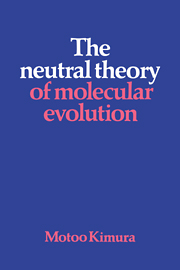Book contents
- Frontmatter
- Contents
- Preface
- Introduction
- 1 From Lamarck to population genetics
- 2 Overdevelopment of the synthetic theory and the proposal of the neutral theory
- 3 The neutral mutation-random drift hypothesis as an evolutionary paradigm
- 4 Molecular evolutionary rates contrasted with phenotypic evolutionary rates
- 5 Some features of molecular evolution
- 6 Definition, types and action of natural selection
- 7 Molecular structure, selective constraint and the rate of evolution
- 8 Population genetics at the molecular level
- 9 Maintenance of genetic variability at the molecular level
- 10 Summary and conclusion
- References
- Author Index
- Subject Index
1 - From Lamarck to population genetics
Published online by Cambridge University Press: 05 August 2012
- Frontmatter
- Contents
- Preface
- Introduction
- 1 From Lamarck to population genetics
- 2 Overdevelopment of the synthetic theory and the proposal of the neutral theory
- 3 The neutral mutation-random drift hypothesis as an evolutionary paradigm
- 4 Molecular evolutionary rates contrasted with phenotypic evolutionary rates
- 5 Some features of molecular evolution
- 6 Definition, types and action of natural selection
- 7 Molecular structure, selective constraint and the rate of evolution
- 8 Population genetics at the molecular level
- 9 Maintenance of genetic variability at the molecular level
- 10 Summary and conclusion
- References
- Author Index
- Subject Index
Summary
At the beginning of the nineteenth century it was almost universally believed that all living beings on earth were immutable divine creations. In bold contrast, the French naturalist, Jean Baptiste Lamarck argued that life could change continuously on a grand scale. Moreover, he provided for the first time an appealing, easily understood process by which such changes could occur. Lamarck published his book entitled Philosophie Zoologique in 1809 propounding this idea when he was already sixty-five years old. Apparently the book attracted little attention when it appeared. It is said that, in his old age, he was neglected by his contemporaries, became blind, and died miserably. His fame came only long after his death when evolution became a heated subject following the publication of Darwin's The Origin of Species. Some of Darwin's opponents drew from Lamarck a theory called neo-Lamarckism, emphasizing the direct effect of environment as the prime factor for evolution. (For an authoritative account of the nineteenth-century approaches to evolution, readers may refer to Simpson, 1964.)
Here our main interest in Lamarck is that he proposed, probably for the first time in biology, a general theory to explain how evolution occurred. As is well known, he assumed that the effect of use and disuse, which in animals is induced by their living conditions, is inherited by offspring and this causes a perfecting tendency in evolution.
- Type
- Chapter
- Information
- The Neutral Theory of Molecular Evolution , pp. 1 - 14Publisher: Cambridge University PressPrint publication year: 1983
- 4
- Cited by



